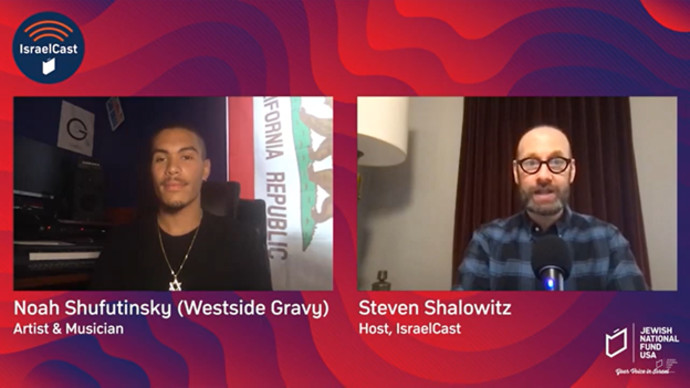In Noah Shufutinsky’s “Diaspora,” the artist, who goes by his stage name “Westside Gravy,” raps, “So you value social justice, are you kiddin’ us, what gives you the right to tell us who’s indigenous?”
Shufutinsky, a rising star in the hip-hop world, consistently blends social consciousness with his lyrics, which reflect his mixed heritage as a black Russian Jew. Raised by a black mother and a Russian Jewish father, Shufutinsky’s ancestors on both sides were forcibly displaced from their homeland, his father being a refugee from the former Soviet Union and his mother’s ancestors being taken from West Africa to be sold into slavery.
In a conversation with Jewish National Fund-USA (JNF-USA) IsraelCast host Steven Shalowitz, Shufutinsky credits his parents with helping him stay connected to his roots, despite the physical distance between his ancestral homelands.


“I come from a people that have been forcibly disconnected from their homeland, whether that was my roots on my mom’s side or my dad’s side, where they were forced to adapt to diaspora culture, but still they made the effort to make everything available to me to make sure my siblings and I had the opportunity to explore our roots and take pride in our identity,” Shufutinsky shared with Shalowitz.
Thanks to his parents, Shufutinsky grew up with a strong sense of identity on both sides. “I was raised in a very strong and proud black Jewish household, and I think that’s where a lot of my pride and my inspiration and connection to my identity comes from,” he said.
He also grew up around different musical styles, listening to reggae, soul, and California oldies, all of which influence his music. “These are people that came from an environment that I didn’t come from, even in a completely different time period, but what they’re able to do with their music is capture the time period and environment where they grew up and present it in a way that’s accessible for everyone,” he said. “And that’s what I gravitated towards creating when it came to expressing myself.”
For Shufutinsky, expressing himself means thoroughly examining his identity. His name, Westside Gravy, is a homage to San Diego, his hometown. He raps about reparations and his experience as a black man in America. He even raps in Hebrew in several of his songs. He notes that being Jewish and black means other people try to define his identity.
“The same way as they’re trying to make Judaism something that you feel like you have to defend, a lot of people are doing that to the black identity,” he told Shalowitz. “A lot of people are making me feel like the black identity is only valid when it’s talking about a struggle against someone else – that it’s only valid when you talk about the hardships of it, not celebrating it.”
But, Shufutinsky said it’s important for one to define their own identity. “It’s up to us to push forward,” he said. “We’re not gonna have to sacrifice who we are, we’re not gonna have to hide who we are, we’re not going to have to force it to fit into boxes because we can expand the way we think and the way we define ourselves.”
In addition, Shufutinsky, who also participated in JNF-USA’s Conversations on Zionism, reflected with Shalowitz on his panel, which featured Amy Albertson, Ysabella Hasan, and was moderated by Hen Mazzig.
“It was really cool because I’ve talked to each individual one on one, usually on social media, so it was cool just to be in one space where all of our voices get to bounce off of each other and hear the amazing things Amy and Ysabella had to say,” he said. “It was amazing to talk to them about similar ideas and bring our own backgrounds to it.”
And while Shufutinsky says he has experienced some instances of discrimination from within pockets of the Jewish community, his Judaism remains a core component of his identity, and he believes that we can all do better, Jews included. “If we want to make sure that everybody is feeling included, then we have to make sure we live up to that and don’t question people based on the color of their skin,” he said. “It’s important for us to recognize that that doesn’t come from a Jewish tradition, but that it’s something some Jews have picked up in the diaspora.”
And part of Shufutinsky’s Jewish identity is a fervent Zionism, a belief that Israel is and should be a safe haven for Jews everywhere. “I think the definition of Zionism has been pretty clear throughout history – it’s the Jewish right to return to our homeland, to live in our homeland, and to maintain a connection to our indigenous homeland,” he said. “It’s our responsibility to make sure that every Jewish person is going to be accepted in the Jewish homeland.”
It’s something he accomplishes one lyric at a time.
JNF-USA’s IsraelCast comes out every other Wednesday at jnf.org/israelcast and is available wherever you listen to your favorite podcasts. To hear new Zionist voices like Westside Gravy, tune in to JNF-USA’s Conversations on Zionism on ZTV.
